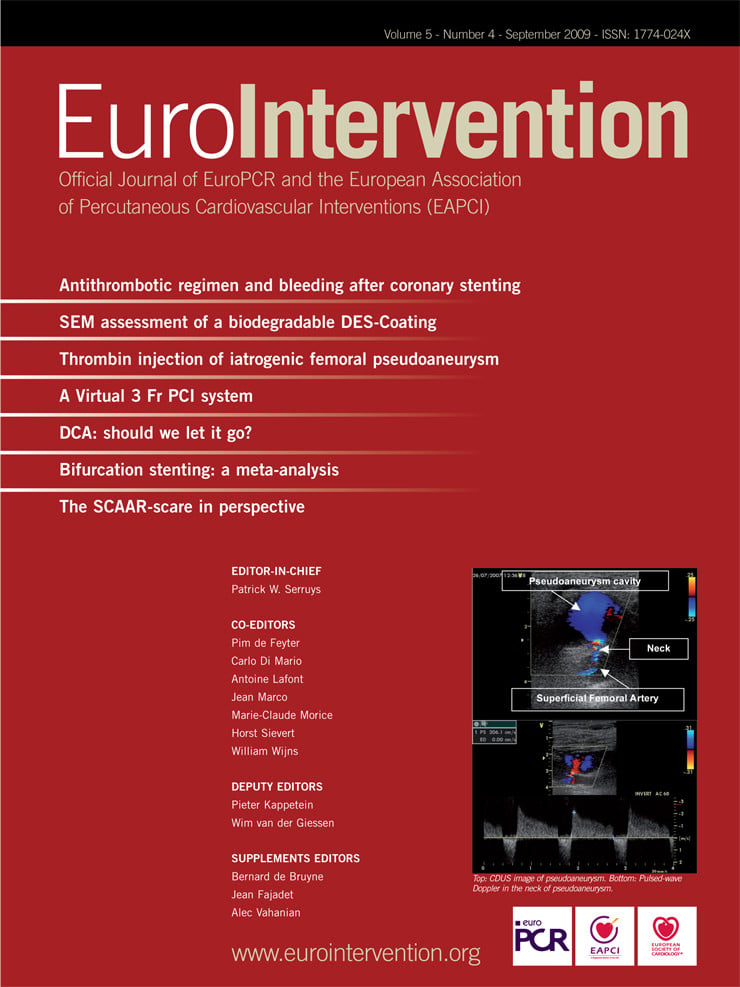Dear Colleagues,
New beginnings
We are pleased to welcome aboard the new president of the EAPCI and an old friend of our specialty, Carlo Di Mario.
The EACPI is still young, and like any fledgling democracy we are pleased that the transition between presidents1 has been a pleasant, as well as a productive one. It is an oft used phrase, that someone does not need an introduction because they are so well known to all of us – and this is certainly true of of Carlo – and yet it cannot hurt to remember the milestones in his career, some of which I was able to personally take part in.
A key opinion leader, Carlo Di Mario was instrumental in the creation of a consensus and guidelines for the use of IVUS (in 1998 he was a member of the nucleus of the working group of coronary circulation of the ESC responsible for invasive diagnostic techniques). He began working with these technologies many years ago with us in Rotterdam, at that time, as a recent article in Circulation pointed out, chancing “...his luck on a technique that seemed truly experimental...intravascular ultrasound. But the dice fell well: he soon received an appointment to a lectureship at the university, and, three years later, he set up and ran the intracoronary imaging laboratory.”2 In 2002, Carlo Di Mario represented the European Society of Cardiology on the DICOM Standards Committee, working to create a standard for handling, storing, printing, and transmitting digital information in medicine.
His international commitment did not rest with technology alone, but to pedagogy as well and his work in continuing medical education is well known. He organised the first European Interventional Cardiology Fellows course at Royal Brompton Hospital in late 2006. He is uniquely capable of taking on the serious responsibilities and immense challenges so ably met by his predecessor and first EAPCI president, William Wijns.
But I would also like to emphasise something about Carlo Di Mario that for us is the very essence of our journal, Carlo by his work and his life represents the very best of European medicine. An Italian, receiving his undergraduate and graduate degrees in his native country, he spent six years with us at the Thoraxcenter of Erasmus University in Rotterdam as both a fellow and an associate before returning to Italy to work with Antonio Colombo as Associate Clinical Director of Interventional Cardiology at San Raffaele Hospital in Milan, Italy. In 2003 he moved again, this time to London, where today he is Professor of Clinical Cardiology, Imperial College of Sciences, Medicine & Technology, Cardiology at the Royal Brompton Hospital.
A European presence
Carlo Di Mario is clearly European, and embodies what is best in our so-called “Old World” and profession – rigour and discipline, continuity with an eye towards the future and an overall commitment to the well-being of our patients and society – and exceptional as he is, he is not alone among us.
As I travel, as I encounter the different participants at our meetings and seminars throughout Europe, I cannot help but believe in the vitality of our continent. The intellectual and creative efforts that are taking place here, the quality of the men and women that participate in this European experiment are thrilling to me, and more exciting than ever before. Europe has much to offer the world, and itself, and I cannot help but remembering the opening remarks of Jean Marco at the last EuroPCR in Barcelona when he spoke of synergistic collaboration3.
We must “fight against scepticism” he said, fight against this questioning of the “true value of evidence” that is so vital to our specialty and our ability to technically advance. To do this we must turn to Europe, creating an “independent, federating body” that “unites the best European intellectual forces” which can only further stimulate “individual creativity”.
Jean Marco’s vision of a “common innovative concept of European Clinical Trials” is also our own, a project whose future is ours and our patients. “EuroTrials”, or whatever we call this great “Idea”, can offer the challenge to our young researchers and doctors to come together and provide the very best of evidenced based medicine... it can shake-up our field and re-invigorate it, providing a home for our very best...and I am sure that the EAPCI under Carlo Di Mario and our journal, EuroIntervention, will remain the vibrant and healthy forums to promote this heady climate of development, progress and change.
Life may be fragile and ever-changing, continuity and progress never fully assured, but we have the unique opportunity in our profession to commit ourselves to doing our very best, today and for the future.

